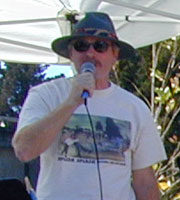The homeless population in Oakland has either mushroomed over the past several years or simply become more visible. This has been particularly true in the areas surrounding Lake Merritt where hot spots have included the Kaiser Convention Center, the Boat House, and the Veterans Building.
I’m most familiar with my own Grand Lake neighborhood, where the number of homeless increased markedly during the period that our walking beat officer was out on disability. As the homeless population grew, there was a corresponding increase in complaints about panhandling, public urination and defecation, people sleeping in doorways and parks, and the litter many of the homeless left in their wakes. Merchants voiced largely unsubstantiated concerns that the homeless were responsible for break-ins and other criminal behavior. They also argued, far more convincingly, that the almost constant panhandling, sometimes bizarre behavior, and public intoxication were driving customers to Emeryville and the suburbs. A great many residents concurred.
Our efforts to address these issues on a strictly neighborhood level were largely fruitless. Through the Grand Lake Community Council (formerly, the Grand Lake Neighborhood Crime Prevention Council), I organized a Neighborhood Forum on the homeless population in May of 2005. That gathering, in part, did provide the spark for Oakland’s initiation of an outreach and support program modeled after the one in San Francisco.
The first two Project Homeless Connect events in Oakland were quite successful and the one being planned for November 13 should be even more so.
Ironically, none of the individuals frequenting Grand and Lakeshore attended these earlier events despite our entreaties. We later enlisted the aid of a social worker from St. Mary’s to try to convince one elderly woman to accept shelter or even file for social security benefits, but to no avail. Our attempts to provide a portable toilet in the immediate neighborhood came up against a bureaucratic stonewall. As a result, the associated health and quality-of-life issues continue largely unabated. Our one victory came earlier this year when four retail establishments with off-site liquor licenses agreed to our request that they not sell to the three individuals whose chronic alcoholism was particularly problematic.
This June, after a two-year absence, a new walking beat officer was finally assigned to the Grand Lake district — prompted by three separate armed robberies in one evening, culminating with the tragic murder of the manager of the Bangkok Palace on Grand.
Officer Ken Kim was welcomed with open arms and quickly began to address safety concerns as well as complaints about the homeless and the abundance of panhandlers. The district is now far safer and quieter and the merchants and neighbors (including me) are largely pleased with the results.
I do, however, remain ambivalent, recognizing that Officer Kim is walking a tightrope between those of us who see the homeless as individuals deserving of compassion and those who want to see them gone at all costs.
Ultimately what is really needed are more shelter beds, low-cost supportive housing, drug and alcohol treatment facilities, and psychiatric care. Until those become available, a crack-down on the homeless would merely move them from one neighborhood to the next.
1 2 Next page »






Comments